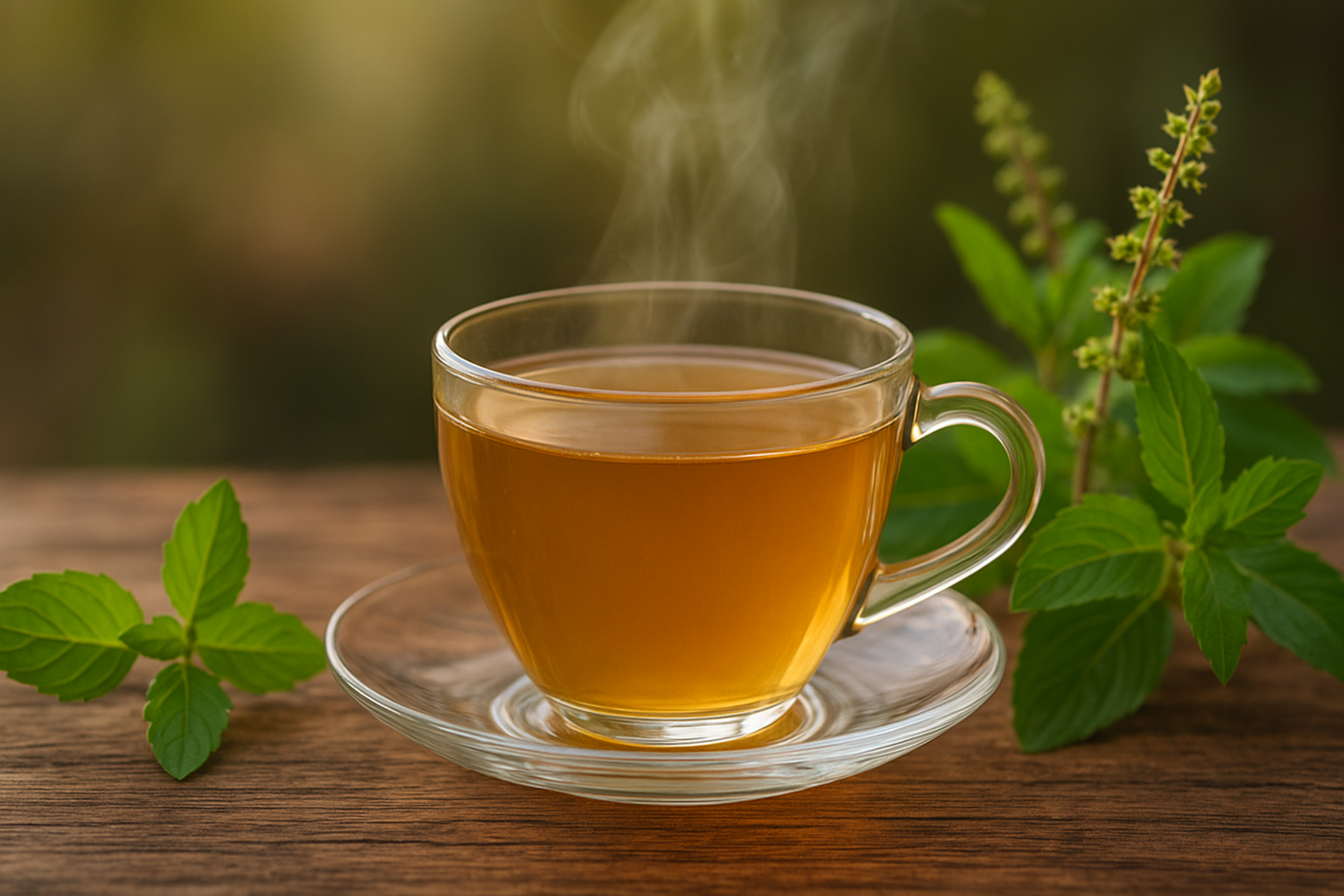Introduction: The Healing Power of Tulsi Tea for Your Lungs
In Ayurveda, Tulsi (Holy Basil) is known as the “Queen of Herbs” — a sacred plant revered for its healing energy and immune-boosting power. When it comes to respiratory health, tulsi tea stands out as one of the most trusted home remedies for soothing coughs, clearing congestion, and improving overall lung function.
Tulsi tea works by cleansing the respiratory tract, reducing inflammation, and strengthening natural immunity. According to a 2024 study in the Journal of Herbal Medicine, regular tulsi tea intake can help reduce symptoms of asthma, bronchitis, and common colds by up to 45%.
Let’s explore how to make tulsi tea for respiratory health — the Ayurvedic way — and how it helps your body breathe easier, naturally.
Step 1: Gather Your Ingredients
You don’t need anything fancy to make tulsi tea. Most ingredients are already in your kitchen or garden!
You’ll need:
- Fresh or dried tulsi leaves: 10–12 fresh or 1 tsp dried
- Water: 1½ cups
- Honey or jaggery (optional): For sweetness
- Lemon juice (optional): For added vitamin C
- Ginger (optional): ½ inch, crushed — helps clear congestion
Tip: Using fresh tulsi leaves gives a stronger aroma and more medicinal potency.
Step 2: Boil and Infuse the Tea
- Pour 1½ cups of water into a pot and bring it to a boil.
- Add tulsi leaves (and ginger if using).
- Let it simmer for 5–7 minutes until the water reduces slightly.
- Strain the tea into a cup.
- Add honey or lemon only when the tea cools a bit (to preserve nutrients).
Result: You’ll have a soothing, aromatic tulsi tea that helps clear mucus, ease breathing, and calm your senses.
Step 3: When and How to Drink It
For best results, drink tulsi tea twice a day — once in the morning on an empty stomach and again before bedtime.
Morning: Boosts immunity and energizes your lungs.
Night: Relieves congestion and supports restful sleep.
Avoid combining it with milk-based drinks immediately after.
Step 4: Ayurvedic Benefits of Tulsi Tea for Respiratory Health
Tulsi tea doesn’t just comfort a sore throat; it deeply supports your respiratory system.
Key Benefits:
- 🌿 Clears mucus and congestion: Acts as a natural expectorant.
- 🫁 Improves breathing: Helps open airways and soothe inflammation.
- 💨 Prevents infections: Its antimicrobial properties combat cold and flu viruses.
- 🧘 Reduces stress-related breathing issues: As an adaptogen, tulsi balances cortisol and relaxes the nervous system.
According to Ayurveda, tulsi balances the Kapha dosha, which is often responsible for respiratory blockages and mucus buildup.
Step 5: Tulsi Tea Variations for Respiratory Support
You can enhance tulsi tea with other herbs for stronger results:
- Tulsi + Ginger Tea: Excellent for sore throats and cold relief.
- Tulsi + Turmeric Tea: Anti-inflammatory and lung-protective.
- Tulsi + Mulethi (Licorice) Tea: Great for dry cough and irritation.
These combinations make tulsi tea a complete home remedy for respiratory care, adaptable for every season.
Conclusion: Breathe Easier with Tulsi Tea
Tulsi tea is more than a soothing drink—it’s a time-tested Ayurvedic tonic that purifies, heals, and strengthens your respiratory system. Making it at home is simple, natural, and highly effective for daily lung support.
Start your day with a cup of tulsi tea for respiratory health and feel the difference in your breath, energy, and overall wellness.
FAQs Section
How often should I drink tulsi tea for respiratory health?
Drink tulsi tea twice daily — in the morning and before bed — for consistent respiratory support.
Can tulsi tea help with asthma or bronchitis?
Yes, studies show tulsi tea helps reduce inflammation and clear mucus, improving symptoms of mild asthma and bronchitis naturally.
Can I drink tulsi tea every day?
Yes, daily consumption is safe and beneficial. However, take a short break every 3–4 weeks to let your body reset.
Is tulsi tea safe for children?
Yes, in small amounts. Use half the usual quantity and consult a pediatrician for kids under 10 years.
Can I add other herbs to tulsi tea?
Absolutely! Combine tulsi with ginger, turmeric, or mulethi for enhanced respiratory and immune benefits.

